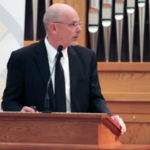CAMBRIDGE, Mass. (RNS)—After federal authorities accidentally triggered a 1993 fire that killed 75 members of an obscure Christian sect near Waco, one of the lessons law enforcement learned was to call religion experts in a crisis where faith is a factor.
Nearly 25 years after the inferno at the Branch Davidian compound, FBI officials and scholars from the American Academy of Religion gathered at Harvard Divinity School to reflect on how the crisis in Central Texas led to a new relationship between them—and on the challenges ahead.
The situation outside Waco began when willing followers of self-proclaimed prophet David Koresh and his Branch Davidian sect barricaded themselves in a heavily armed compound. After 51 days, law enforcement moved to end the standoff by force but had “no qualified knowledge of how highly religious people would respond to the storming of (their) building,” retired Harvard law professor Philip Heymann said.
As deputy attorney general at the time, he wrote a report in the aftermath of the Branch Davidian crisis that emphasized the need for seeking out religious expertise in dealing with confrontations.
Religion 101
Since then, American Academy of Religion scholars have advised the FBI’s Critical Incident Response Group when dissident religious groups that are not generally well-understood come into conflict with law enforcement. Scholars also work with the FBI’s National Academy to equip new agents with a wider range of religious understanding.
“We don’t have an excuse not to ask for advice,” said David T. Resch, who was part of the FBI team at Waco and now is special agent in charge of the FBI National Academy.
With the American Academy of Religion, the FBI has “a mechanism to reach out of our comfort zone” in recognizing where offenders’ and victims’ actions are shaped by religious beliefs that “as a Methodist, I may not know,” Resch said.
However, he noted, creating a “Religion 101” road map for current and future law enforcement officers is not so simple. Not everyone agrees on what the curriculum should be in this religiously diverse society—one where conflicts also arise shaped by racial division, varying political worldviews and disparities in power.
Meanwhile, other pressing factors figure into law enforcement’s decision-making.
Sign up for our weekly edition and get all our headlines in your inbox on Thursdays
“Loud bells are ringing,” said Resch, citing terrorism, hate crimes, concerns about police misuse of power, public corruption, organized crime and more. “The time from flash to bang and the trajectory toward violence has been sharply condensed. We need to move more quickly and choose the least bad answers.”
Troubled history
And they must do this while suspicion of the FBI still threads through its history with religious groups and religious social justice activists, said University of Pennsylvania professor Steven Weitzman. He is co-editor of a new book, The FBI and Religion: Faith and National Security Before and After 9/11.
Weitzman looked back decades, when Quakers, Black Muslims and Catholic anti-war activists were seen as suspicious, and FBI Director J. Edgar Hoover positioned the agency as upholding Judeo-Christian values in opposition to “godless communism.” Hoover’s effort to degrade the reputation of Martin Luther King Jr. and to undermine the civil rights movement still is top-of-mind for many African-Americans, Weitzman said.
“FBI has been a major player, and sometimes a major disruptor in American religious life,” he said. Now, he sees the American Academy of Religion trying to change the culture “for the good of all and the future of religiously motivated dissent” at a time when both scholars and the FBI are confronted by radical, violent groups that may root their actions in religious claims.
This is not a unique dilemma to the United States, said Eileen Barker, emeritus professor of sociology at the London School of Economics and Political Science in the United Kingdom, where 1,000 religious groups have emerged just since World War II.
Barker founded and leads a nonprofit called Inform that responds to requests from public officials about these little-known groups. The nonprofit doesn’t offer advice but it aims to give “accurate and unbiased information and put it in a cultural framework,” she said.
Boston University sociology professor Nancy Ammerman said the need for nuanced understanding that religion scholars can offer does not apply only to situations that can turn violent.
“What do any people who want to engage in public policy need to know about religion, and how can we help them get to know this?” she asked. “The answer is just like what’s happening in the FBI—the need for ‘Religious Literacy 101.’”















We seek to connect God’s story and God’s people around the world. To learn more about God’s story, click here.
Send comments and feedback to Eric Black, our editor. For comments to be published, please specify “letter to the editor.” Maximum length for publication is 300 words.